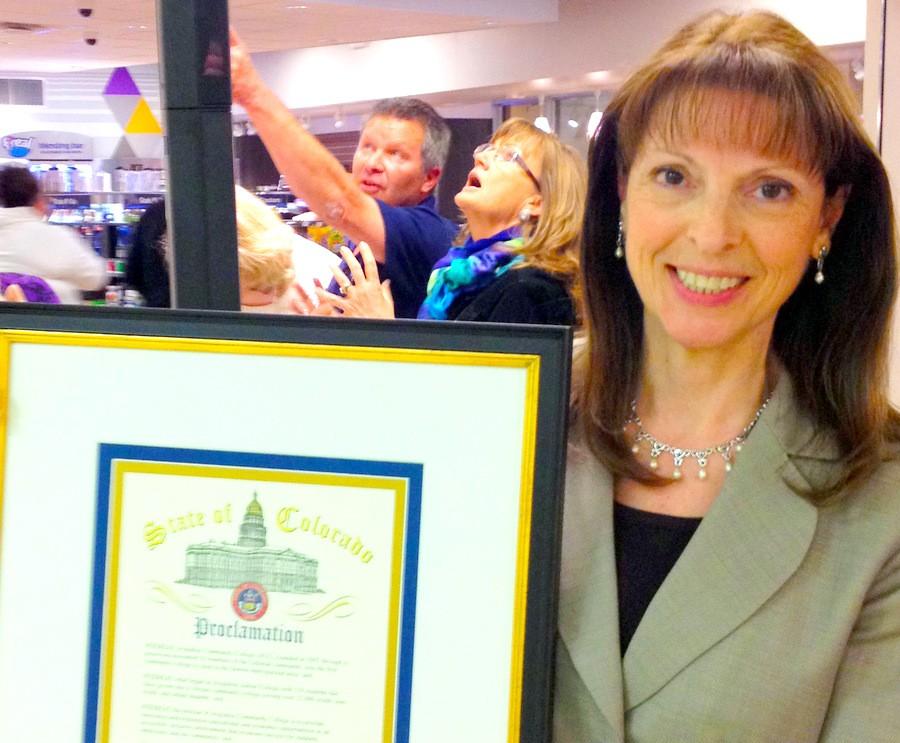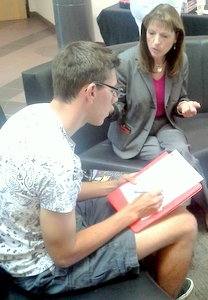President Diana Doyle to students: Please help us help you succeed
Image via Courtesy Littleton Independent
Dr. Diana Doyle, president of ACC, holds a proclamation signed by Gov. John Hickenlooper, declaring May 4 “ACC Day” in this file photo.
ACC doesn’t have an ivory tower, and that’s just fine with its president. She wouldn’t want to be there anyway.
Dr. Diana Doyle loves to get away from her desk to speak with students and faculty whenever she can. She even has a word for her contacts with students – plunking.
Doyle, who has a doctorate in public administration, likes to stroll into the Espresso Yourself café or commons area and plunk herself down next to a student.
“I love the initial reaction of the student,” she said.
But she has a lot more on her plate than this, as any college president does. For example, she plans for ACC to offer two bachelor’s degrees in a couple of years, and she has to keep all degrees relevant while ensuring a meaningful experience for traditional and non-traditional students.
In addition, Doyle believes that the success of ACC depends partially on her ability to understand business and industry trends in the community and beyond. “ACC has to move at the same pace as society, business, industry and the four-year universities,” she said. “If the graduate’s transcript is not relevant or they are not ready to transfer, ACC is doing a mediocre job. This is simply unacceptable,” she stressed.
To meet the growing need for specialized education in designated fields, ACC hopes to offer two Bachelor of Applied Science degrees by 2017. In 2014, legislation passed that allows community colleges to offer certain bachelor degrees in applied science, degrees geared more toward technical and career paths such as broadband technology or culinary arts.
The guiding criteria for offering bachelor degrees at community colleges are:
• To avoid duplication of degrees offered by four-year universities.
• To consider labor/ market demand for the skills.
• To avoid market saturation in certain areas.
One way Doyle stays attuned to student needs and interests is connecting with the Student Advisory Team. The team is composed of a cross-section of the student body from most organizations on campus.
Representatives from student government, each of the three campuses, concurrent students (enrolled in high school and ACC at the same time), night students, veterans and others meet with her regularly to serve as her eyes and ears on campus. She considered their feedback in creating the 2015-2020 strategic plan.
Student Caleb Reagor, a member of this year’s Advisory Team and Student Body President, says the team will meet in the next few weeks for the first time, and monthly after that. Wearing two hats this year, Reagor sees his role on the board as an extension of his role as president. His current focus as president is “bringing more involvement and publicity to the clubs at ACC.”
“I am beholden to the voters (students), and I plan to advise Dr. Doyle accordingly,” Reagor said.
Though students often serve as her eyes and ears for what might be changed or improved, faculty members implement programs, and she is proud of them. “They are all dedicated to teaching,” she said.
Instructor feedback of what works and what doesn’t is invaluable, she said. Many faculty members have more than one advanced degree, and a sizable number are published authors.
Doyle depends on the dedication of teachers and their desire for students to succeed. Relatively small class size (usually 17-20 students) enables instructors to know their students by name and be aware of what resources individual students need.
Statistics show that ACC has students from many backgrounds and with a substantial range of ages, often bringing different needs.
To address diverse student needs, ACC has an infrastructure of people and programs. These include the Writing Center and Student Success Center, as well as programs for specific groups, such as veterans.
The pressing issue to Doyle is students’ reluctance – sometimes failure – to take advantage of these programs. She feels that every student should – at a minimum – attend orientation to ease the transition to college life. That doesn’t always happen.
She realizes some students at the college level have personal obligations that preclude stopping by the Student Success Center, the Writing Center or an advisor’s office. Even with online assistance and flexible schedules at the centers, only a small percentage of students seek help. Doyle’s continuing goal is to make students aware of the available support – and to get them to take advantage of it.
“We are always looking for ways to get the information out there,” she said.
Doyle understands students’ time constraints, juggling school and family obligations, leaving little time to access this support. She encountered similar challenges when her children (now grown) were young. She recalls evenings when she and a child did homework together.
Despite time constraints and other difficulties, though, Doyle advises students to focus on the future. “It is important to pursue your goals, because you serve as a role model for the importance of education,” she said. “Children take their cues from parents.
“Parents need to pick and choose priorities carefully,” she said. “They are trying to be perfect at everything, and they cannot do it all perfectly.”
She earned her doctorate in public administration (with a higher education emphasis) at the University of Colorado-Denver in 1994. Earlier, she earned her master’s degree in counseling education from Illinois State University. Her work career has taken her through Community of College of Denver, Western Nebraska Community College and Colorado School of Mines.
Doyle is an outdoor enthusiast, and her favorite place to hike is Rocky Mountain National Park. Travel is a passion, and her greatest adventure was a trip to China where she tasted a Chinese delicacy – chicken feet. She described this treat as crunchy – and no, it did not taste like chicken.
The president has an open door policy and encourages all to contact her with issues about the college of their experience at ACC. She is always more than happy to meet with students – even if to discuss the texture and taste of chicken feet.




